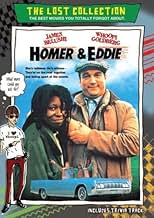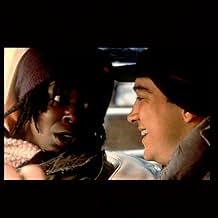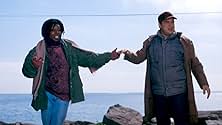IMDb RATING
5.3/10
2.1K
YOUR RATING
A mentally disabled man gets help from a sociopath when he tries to reunite with his dying father, who years earlier disowned him.A mentally disabled man gets help from a sociopath when he tries to reunite with his dying father, who years earlier disowned him.A mentally disabled man gets help from a sociopath when he tries to reunite with his dying father, who years earlier disowned him.
- Awards
- 1 win & 1 nomination
Jim Belushi
- Homer Lanza
- (as James Belushi)
Jeff Thiel
- Twin #2
- (as Jeffrey Thiel)
- Director
- Writer
- All cast & crew
- Production, box office & more at IMDbPro
Storyline
Did you know
- TriviaBest buddies in this movie, Whoopi Goldberg and Jim Belushi previously appeared as rivals in Jumpin' Jack Flash (1986).
- GoofsWhen Eddie spots the red car at the produce stand and tells Homer to pull in there, she is in the back seat. After they pull in they show her sitting in the front seat.
- Quotes
Eddie Cervi: Feelin' pretty good? Then let's go!
- SoundtracksDown Home Jubilee
Performed by Susi Beatty
Written by Dennis Morgan, Spady Brannan & Susi Beatty
Produced by David Malloy
Courtesy of Little Shop of Morgansongs/Spady Music/S.G.P. LTD
Featured review
Though it has been years since I have seen this movie, I remember it with affection and feel compelled to counter the sweeping dismissals of many reviews.
In the bone-hard truth of the desert, humanity is stripped down to persistence, interdependence, and hope and faith in the absence of a visible destination. The road is a trajectory for self-recognition, catharsis, and redemption. And so, just as the desert surprises us with life in the most unexpected places, Homer and Eddie surprise themselves.
Homer and Eddie are not that unlikely a couple. Neither has anywhere to go, figuratively or literally; so they keep on going. Neither has a future to look forward to, and yet each of them harbors hope. They do so because they are still alive, and moving and hoping are as basic to life as breathing. They did not choose each other's company, and they are no less prejudiced towards others for their own low station in society.
Though a road movie, `Homer and Eddie' it is not of the usual sort. Violence here is not redeemed by a `good cause' or an undercurrent of sex appeal; vile speech is not tempered by youth or good looks; and there is no romantic involvement to offer distraction. Homer and Eddie are not Thelma and Louise. They have more in common with Lennie and George in `Of Mice and Men', or with Josué and Dora in `Central Station'. Sidelined by society for crime, poverty, terminal disease and mental disability, Homer and Eddie begin their companionship by default. Eddie reluctantly looks after Homer, like a parent after a stranger's child. As she takes on responsibility for someone more helpless than herself, Eddie senses a reawakening of her capacity to care (in every sense) for another human being and, implicitly, for herself. By defending Homer's human dignity, she recovers her own. Though it will not avert her fate, the experience restores Eddie's humanity.
I found the film empowering because it takes its protagonists and their situation seriously. Homer and Eddie are not innocent. Nor are their shortcomings dismissible as picturesque, colorful, or cute. They don't try to be lovable; they simply are who they are. Their humor is that of people who believe they have nothing to lose. The film's perspective is level and from the inside out, not from the lofty perch of mainstream society. In that sense, it isn't judgmental, either, and so allows us to empathize with its outcasts. Their heroism is in their refusal to be victims, and in rising above their situation against all odds. This quiet and remarkably subtle piece is some of the best I have seen of Hollywood, and the tears I cried were those of joy and relief: No matter how low you sink in life, it is never too late to be a worthy human being.
In the bone-hard truth of the desert, humanity is stripped down to persistence, interdependence, and hope and faith in the absence of a visible destination. The road is a trajectory for self-recognition, catharsis, and redemption. And so, just as the desert surprises us with life in the most unexpected places, Homer and Eddie surprise themselves.
Homer and Eddie are not that unlikely a couple. Neither has anywhere to go, figuratively or literally; so they keep on going. Neither has a future to look forward to, and yet each of them harbors hope. They do so because they are still alive, and moving and hoping are as basic to life as breathing. They did not choose each other's company, and they are no less prejudiced towards others for their own low station in society.
Though a road movie, `Homer and Eddie' it is not of the usual sort. Violence here is not redeemed by a `good cause' or an undercurrent of sex appeal; vile speech is not tempered by youth or good looks; and there is no romantic involvement to offer distraction. Homer and Eddie are not Thelma and Louise. They have more in common with Lennie and George in `Of Mice and Men', or with Josué and Dora in `Central Station'. Sidelined by society for crime, poverty, terminal disease and mental disability, Homer and Eddie begin their companionship by default. Eddie reluctantly looks after Homer, like a parent after a stranger's child. As she takes on responsibility for someone more helpless than herself, Eddie senses a reawakening of her capacity to care (in every sense) for another human being and, implicitly, for herself. By defending Homer's human dignity, she recovers her own. Though it will not avert her fate, the experience restores Eddie's humanity.
I found the film empowering because it takes its protagonists and their situation seriously. Homer and Eddie are not innocent. Nor are their shortcomings dismissible as picturesque, colorful, or cute. They don't try to be lovable; they simply are who they are. Their humor is that of people who believe they have nothing to lose. The film's perspective is level and from the inside out, not from the lofty perch of mainstream society. In that sense, it isn't judgmental, either, and so allows us to empathize with its outcasts. Their heroism is in their refusal to be victims, and in rising above their situation against all odds. This quiet and remarkably subtle piece is some of the best I have seen of Hollywood, and the tears I cried were those of joy and relief: No matter how low you sink in life, it is never too late to be a worthy human being.
- How long is Homer and Eddie?Powered by Alexa
Details
- Runtime1 hour 40 minutes
- Color
- Sound mix
- Aspect ratio
- 1.85 : 1
Contribute to this page
Suggest an edit or add missing content


































